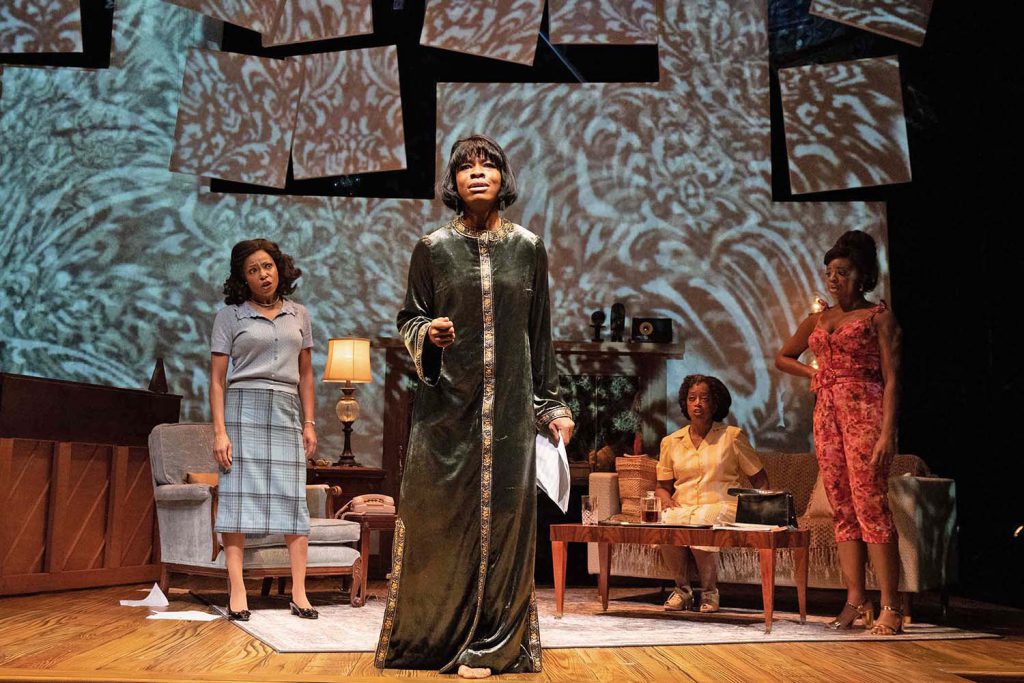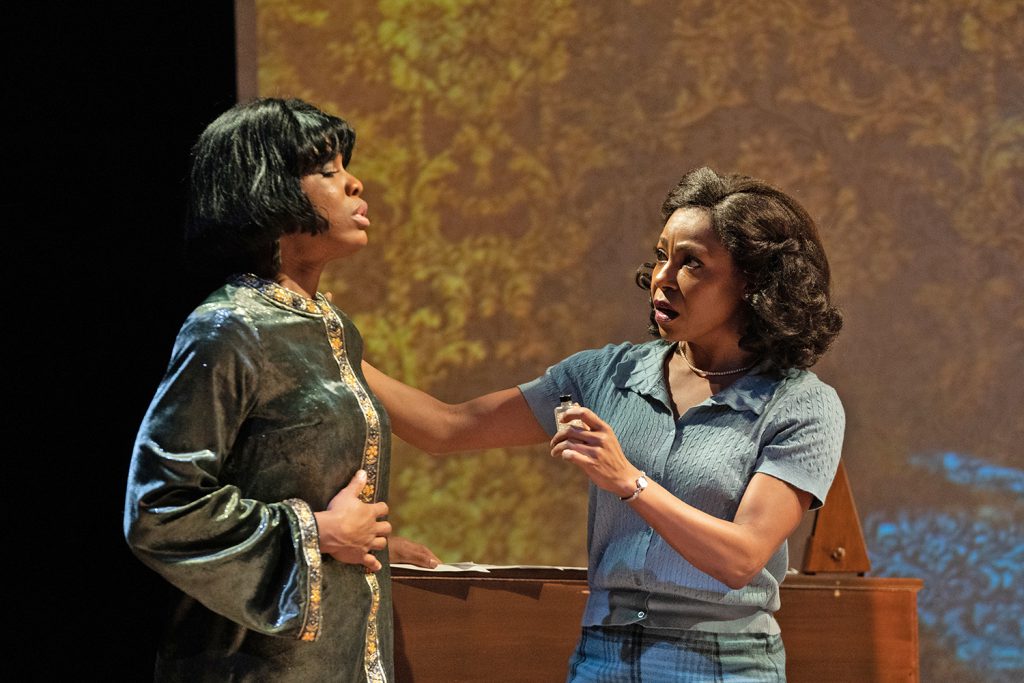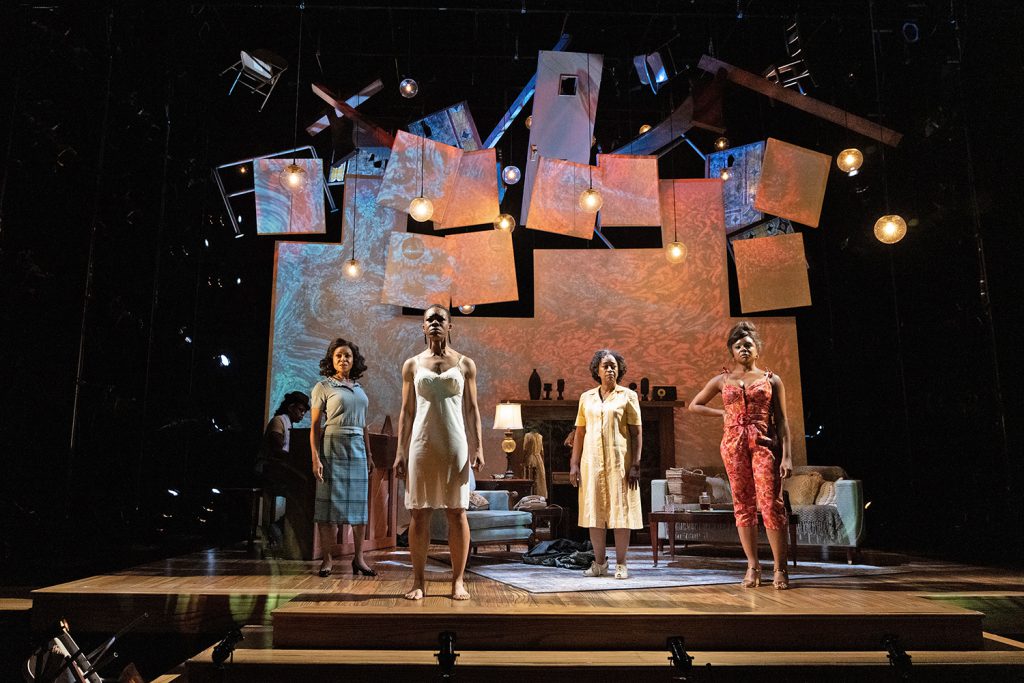
By Eric Marchese | Special to the NB Indy
The history of the Civil Rights Movement is studded with the names of black activists dedicating their entire lives to effecting changes that would create a more just society.
The incredible sacrifices they made, and the way each saw his or her existence altered, is a story in itself.
Nina Simone was one the many who took it upon herself to advance the movement – in her case, by using her talents as a singer, musician, composer, recording artist and concert performer.
Her story is getting its due in South Coast Repertory’s new production of “Nina Simone: Four Women,” the 2016 play’s Orange County premiere.
Playwright Christina Ham, working closely with director Logan Vaughn, has given her script an overhaul. The result is essentially an entirely new work and therefore qualifies as a world premiere.
The play depicts Simone on Monday, September 16, 1963, the day after the 16th Street Baptist Church in Birmingham, Alabama, was rocked by a bombing that killed three 14-year-old girls and one 11-year-old girl and injured more than 20 congregants.
The tragedy was like a gut punch to Simone, and Ham’s play shows her at her comfortable, upper-middle-class home in Mount Vernon, NY, churning with stunned ange and vowing to do something about it.
That “something” takes the form of a protest song designed to jolt listeners out of their complacency toward centuries of violence being visited upon America’s blacks.
“Mississippi Goddam” was indeed a call to action, but it also cost Simone in terms of career success and popularity with her fans.

The play begins with Nina (Chibuba Osuala) listening to radio news reports of the bombing and its aftermath. She’s gripped by the sound of a horrendous explosion and of people screaming in pain and out of fear.
The jarring moment of the bombing is repeated throughout the play, providing a form of violent punctuation. Each time, black-and-white images of the bombing are projected onto the set’s upstage back wall.
What quickly becomes clear is that Nina’s perception of external events is filtered through her own psyche. Does she suffer PTSD, hallucinations or a mental disorder? Simone was indeed, decades later, diagnosed with bipolar disorder, but in 1963, she was grappling with these inner demons on her own.
We wrestle, just as Simone did, with what we’re seeing. What Ham, Vaughn and company do make clear is that even before the church bombing and the murder of Medgar Evers (also in 1963), Simone was already agitated, the tragedies unleashing a torrent of emotions within her.
In the play, Simone’s feelings take the form of three women who exist entirely within her imagination, characters that allow playwright Ham to articulate the plethora of confusing thoughts and feelings roiling within her protagonist.
With Osuala’s riveting performance, roil they do, her Nina fierce and frustrated, spiky, and admirably determined to complete her new “anthem” and help give the movement yet another voice.

Osuala paces Jack Magaw’s elegant set like a caged tiger anxious to break free of confinement, and the emotion in Nina’s saying she’s “hungry for revenge” reveals her deadly earnest.
Sarah (Jennifer Leigh Warren), the first of the three women to materialize, is loving and maternal, the favorite “auntie” who comforts and nurtures, typifying pre-movement black women.
The cultured, well-dressed and well-spoken Sephronia (Arie Bianca Thompson) uses her style and polish to convince others to take up the cause – and she gets in Nina’s face and riles her, challenging her to put up or shut up.
Sassy entrepreneur Sweet Thing (Meredith Noël) uses her body “as a weapon” to get what she wants. Feeling overlooked by the movement, she trusts no one and is out only for herself.
The four interact throughout the course of “Nina Simone,” offering us a complex but not always coherent view of the legendary singer and activist’s fragmented and often tortured existence. Osuala, Warren, Thompson and Noël are outstanding, and the spot use of humor and bracing profanity help lighten the play’s generally solemn tone.
The play’s fifth character, Sam Waymon – based on Simone’s brother – floats in and out of Nina’s mind, playing the piano for each musical number. Richard Baskin Jr.’s work is, like his castmates, admirable, his portrayal of Sam less crucial than his work as musical director, arranger, pianist and composer.

Music indeed plays an integral role in this play, which culminates in a performance of “Mississippi Goddam” by the entire cast in the moments just after Simone has completed her lacerating new anthem.
“Nina Simone: Four Women” thus takes Simone (and us) right up to, but not beyond, the point where the singer’s new course drastically alters her life. While that’s probably a wise choice by Ham, the play’s conclusion leaves us with the feeling of somehow having come up short.
Seeing some of what Simone endured is indeed wrenching, but if there’s a way to effectively communicate that experience, Ham and Vaughn and company have yet to discover it. However promising “Nina Simone: Four Women” is and might be, it’s still a work in progress.
Ham skillfully weaves much of Simone’s life story into the script. More difficult and elusive is her effort to craft a play that gets us to understand Simone’s feelings and to have a better grasp of the creative process.
Perhaps Nina Simone’s life and various battles are too complex and too nuanced to be represented on stage in a way that’s satisfying to audiences. Hats off to SCR for trying, and Ham will, no doubt, continue pounding away at this project in search of perfection in much the same way as Simone did in crafting the song “Mississippi Goddam.”
“Nina Simone: Four Women” already shows tremendous promise. Hopefully it will evolve into something that will excite, thrill and inspire theater audiences everywhere.
Julianne Argyros Stage, South Coast Repertory, 655 Town Center Drive, Costa Mesa. Through October 23. Running time: One hour, 25 minutes (no intermission). Tickets: $32 to $105. Purchase/information: 714-708-5500, www.scr.org.
